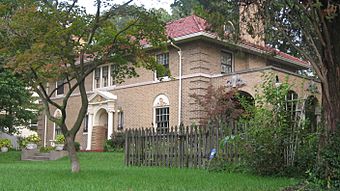Kenilworth Avenue Historic District facts for kids
Quick facts for kids |
|
|
Kenilworth Avenue Historic District
|
|

A house in the district
|
|
| Location | 1131-1203 Salem Ave. and 701-761 Kenilworth, Dayton, Ohio |
|---|---|
| Area | 6.5 acres (2.6 ha) |
| Built | 1903 |
| Architectural style | Tudor Revival, Neoclassical |
| NRHP reference No. | 06000695 |
| Added to NRHP | August 9, 2006 |
The Kenilworth Avenue Historic District is a special neighborhood in Dayton, Ohio. It's a place where many old and important houses are kept safe and preserved. Most of these homes were built after a very big flood in 1913. The district shows off many cool architectural styles and is recognized as important by both local and national groups.
Contents
What is a Historic District?
A historic district is like a special zone where buildings, sites, or objects are protected because they have a lot of history or unique architecture. It's a way to save important parts of our past for future generations to enjoy.
Why Kenilworth Avenue is Special
After the Great Dayton Flood in 1913, many rich families decided to move away from the older parts of Dayton. These older areas were near the Great Miami River and often flooded. So, they started building new homes on Kenilworth Avenue, which was safer.
The houses on Kenilworth Avenue are really interesting because they show off many different building styles. You can see homes built in the Italianate, Tudor Revival, Colonial Revival, and Neoclassical styles. It's like a walk through different periods of architecture!
Homes and Landscaping
This area is sometimes called "Dayton View Heights." It has twenty different buildings. Seventeen of these buildings are considered "contributing properties." This means they are old enough and important enough to be part of the historic district. Three other buildings were built later, in the 1950s and 1960s, so they are not considered part of the original historic period.
One of the oldest houses in the district was built in 1906. It's located at the corner of Kenilworth and Salem. When Kenilworth Avenue was first developed, people wanted to live in a place that felt like a park. Because of this, the street has beautiful, well-kept landscaping. This green space is also a very important part of the historic district.
Protecting Kenilworth Avenue
The Dayton City Commission is a group of local leaders who help run the city. On March 1, 2006, they made Kenilworth Avenue an official local historic district. This means that if someone wants to change a building in the district, they need to get approval from the local authorities first. This helps keep the neighborhood's historic look.
Five months later, the district was also added to the National Register of Historic Places. This is a list of important historic places across the United States. Being on this national list doesn't stop people from changing their homes, but it does show how important the area is.
When Kenilworth Avenue became a historic district, it was the twelfth one in Dayton. It was also the eighteenth district in the city to be listed on the National Register. It's one of six historic districts in the northwest part of Dayton. Some of the others include Dayton View, Grafton-Rockwood, Squirrel-Forest, McPherson Town, and Steele's Hill-Grafton Hill.



